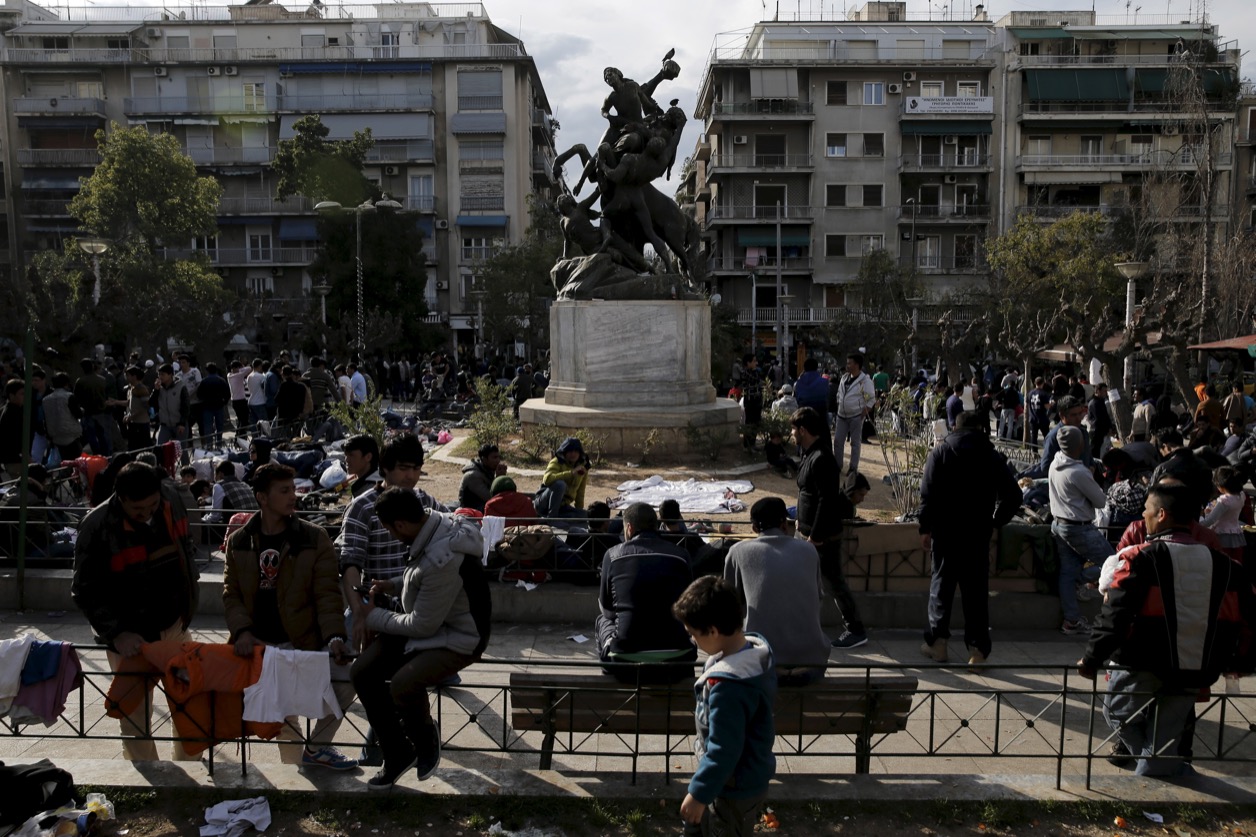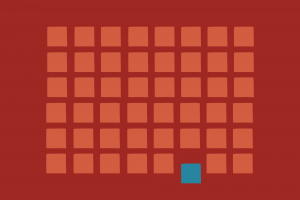
A Very British Rise in Conspiracy Theories
by Matilda Houston-Brown | April 8, 2021
It is 5 September 2020, Oxford Street. A woman holds a sign declaring ‘STOP CHILD EXPLOITATION #SAVEOURCHILDREN’. Jostling protestors are chanting outside the Disney store, screaming at the bright red logo.
It is 17 October 2020, Trafalgar Square. ‘NO TO MANDATORY VACCINES. SAVE OUR CHILDREN’ reads one sign. Piers Corbyn, conspiracy theorist and COVID-19 denier, speaks to the crowded square: “Bill Gates wants vaccinations to control you and to control women’s fertility to reduce world population. That is his game and he’s going to get loads of money off it, and you will pay with your money and your life.”
It is 2 February 2021. In a video uploaded to BrandNewTube, Vernon Coleman (an anti-vaccination advocate) leans back against a leather chair and claims: “We still don’t know what’s going to happen to people who have the vaccine, or what might happen to any children they might manage to have.” Entitled Doctors and Nurses Giving the Covid-19 Vaccine Will Be Tried as War Criminals, the video has 150,000 views.
***
QAnon, a far-right conspiracy theory born out of a 2017 anonymous message board post on 4Chan, centres around the presumed existence of an elite cabal of child-trafficking (and sometimes, child-eating) paedophiles. Widely considered an American phenomenon, QAnon often identifies supposed paedophiles as members of the Democratic National Committee (DNC). Donald Trump is frequently positioned as the saviour who will carry out ‘The Great Awakening’ (the day of supposed justice). When Trump supporters stormed the Capitol on 6 January 2021, not many people considered the riot a British issue. After all, Trump fanaticism is American – it’s about “Making America Great Again”, not Britain. These rioters waved ‘Q’ flags alongside the red, white, and blue. Britons can be forgiven for neglecting to think that this ominous letter signals the same conspiracy here.
Even though UK accounts had been producing swathes of QAnon content since that fateful post in 2017, most people wouldn’t have known it. The ideas and lexis espoused was often deeply American, and a theory with US-centric heroes and villains held little interest for a wider British audience.
Then the UK went into lockdown.
As Britain’s time inside skyrocketed, so too did our time online, and the UK population’s relationship with misinformation changed drastically as a result. Annie Kelly, a UK correspondent on the QAnon Anonymous podcast, which tracks the spread and rise of the conspiracy theory, noted a growth in discussion around figures such as Prince Andrew and Jimmy Savile – the villains became British. “The tenor and the content of the sort of QAnon posts that were being created changed,” explains Kelly. “It became much less of a sort of identikit QAnon content, hitting all of these familiar themes about the DNC and the deep state.”
Over the summer of 2020 many might have come across these falsehoods without realizing it: #SaveOurChildren was everywhere. At a time when sourceless infographics with colourful aesthetics were being shared to Instagram stories, inaccurate statistics about child trafficking bloomed. This ‘new face’ of the conspiracy theory, dubbed ‘pastel QAnon’ by experts, led to several protests across the UK and around the world claiming to be against child trafficking. These protests were governed by a nebulous fear for ‘our children’, a fear so visceral that it resulted in chanting and screaming outside a Disney store and even Buckingham palace.
Kelly was in London in August when thousands marched: “I definitely got the sense [that] it was a mix of people. Some people had signs with #TheGreatAwakening, all of this sort of stuff. But quite a few of them I think had that familiarity with the name [QAnon], but not much more than that. I got the sense that quite a lot of them came from a slightly more New Age background, talking about energy and transcending. All of that stuff was just very, very new to me when studying alt-right movements in the UK and the US.”
Especially in the UK, an awareness of QAnon is not necessary for one to start believing in a QAnon adjacent conspiracy theory. In fact, it is more often than not seemingly innocuous and trustworthy accounts that spread the most misinformation.
The British anti-vaccine Instagram account, @mrs.r.sullivan, has 11.8k followers, and a feed full of selfies with her own children, inspirational quotes, and screenshots from articles surrounded in frantic red circles. Her bio declares “Naturopathic and holistic health” and contains the CND (peace sign) symbol emoji. She is a “freedom fighter”, a “truth seeker”, and throughout her content she shares a need to protect individuals, especially children, from danger. Under a photo with her child where she mentions treating her daughter’s chicken pox with honey, one commenter jokes: “Are you gonna cook her.” @mrs.r.sullivan’s response: “hahahhaa I’m not into eating kids like all these celebrities and politicians….[sic].” This narrative of child-eating elites is one of the more extreme beliefs of QAnon followers. In another photo, a child in a plastic tiara looks through a heart made from her hands.
Not only this, but many of the UK’s anti-lockdown campaigns are proponents of conspiracy theories that frequently overlap with QAnon. Stand Up X, a British anti-lockdown organization (which had 24.8k followers before the account was deleted by Instagram on the 26 February 2021), organised a multitude of anti-lockdown protests in Britain and has another planned for March. The language of Stand Up X is aggressive, but most notable is the organisation’s structure, separated into a multitude of local branches – according to the Stand Up X Telegram Channel there are 41 regional chapters in the UK alone, everywhere from Manchester to Shropshire.
Often these regional accounts expose the layers of misinformation and theorising at the heart of anti-lockdown rhetoric. @StandUpSurrey, an account with 21.3k followers, claims there is a “plandemic” and references #SaveOurChildren as well, acknowledging on 6 February that they “can’t [hashtag] [Save Our Children] because it’s banned.” In a video from the recent Dublin anti-lockdown protest posted to the account on 28 February, the location tag is “The Great Awakening”: the QAnon day of reckoning taking on a resolutely British flavour. There are multitudes of flourishing British Instagram accounts meshed in a web of conspiracy theories, often manipulatively over-emphasising a nefarious danger that children face – whether it is from paedophiles, vaccines, or lockdown itself.
Alarmingly, these accounts aren’t difficult to find. Though Facebook, Instagram, and Twitter claim they have made recent crackdowns on misinformation, a search on Facebook for “covid hoax” leads immediately to a public profile of a British man sharing conspiracy content. In less than a minute, you are watching a video claiming that the nefarious “they” have murdered Captain Tom with a vaccine. Even post-Capitol riot, after the whole world saw the potential result of this fringe extremism, a few carelessly chosen words in a Facebook search bar are all that is needed to fall down a rabbit hole. Conspiracy has slipped into people’s lives.
Social media platforms are all too willing to stand by and let these lies fester. The Centre for Countering Digital Hate (CCDH) has carried out numerous studies detailing the failures of social media platforms to combat this rise of fabricated propaganda. In a recent report entitled ‘Failure to Act,’ CCDH showed that from one thousand COVID-19 misinformation posts reported in August 2020, social media platforms only acted on 5%.
“It shouldn’t take campaigners and researchers telling Facebook for years about a problem for them to fix it only when it blossoms into full social issue. We’re always looking at how good they are at enforcing their own content policies. It’s early days but we’ve seen perhaps a very, very slight improvement in their enforcement, but we were starting at a base of only acting on 5%. So, it’s still incredibly poor,” explains Callum Hood, CCDH’s Head of Research. “And as a researcher, one of the things I find most frustrating is they will regularly design features into their apps and their web platforms which make the problem worse. In reports dating back to March last year, I’ve written information to highlight the fact that if you go onto a page on Facebook, it will recommend you three further pages all of which generally promote either the same or some new variety of conspiracy, or misinformation or hate you’ve been exposed to.” At the time of this article’s publication, that feature is still there.
Whilst platforms stand by, profiting off divisive content which keeps people scrolling, the uncomfortable reality that individuals find comfort in being told lies becomes clearer and clearer. Figures such as the antisemitic conspiracy theorist David Icke have rarely been considered reliable sources – yet, increasingly, you can stumble across suggestions that “they laughed at David Icke years ago they are not laughing now the fools [sic].” In a climate where people are continuously frightened and unsure, figures such as Icke are increasingly appealing to those who seek a collective community.
“You have some very clear baddies and you can focus on who’s in the baddies’ club and who isn’t. In a way that is a comforting worldview, where all of these problems can be attributed to a group who are just plain evil,” says Kelly, expanding on the interest in the conspiracy theory over lockdown. “And you don’t have to think about the complexity of life and what structures our environment. You just have some clear evil cabal who commit the most horrific crimes any human being can think of.”
Deplatforming campaigns have had some success in combating the rise of this worldview. Icke was growing at a momentous rate before his platform was removed in May 2020 (partly due to pressure from organizations such as CCDH). Though these individuals can move to new platforms – BrandNewTube, Parler, Gab – they rarely pick up the same following as before, combating the sprawl of their theories. The debate should not be about “freedom of speech,” Hood points out, but “freedom of reach.” How far can we allow lies to spread before we learn to do something about them?
How many people storming the Capitol building on 6 January 2021 were parents who had stumbled across a hashtag that summer and thought that they were protecting children?
It’s important to maintain perspective when it comes to the spread of conspiracy theories. Over 80% of the UK population are keen to take the vaccine. Even if a video of a man storming Specsavers and shouting that vaccines contain “nanoparticles” has 60k views, it does not mean that this is a widely held belief. And, as Kelly points out, it’s almost comedically absurd to see groups of people chanting “paedophile” through the gates of Buckingham Palace: “You can be thinking, it’s a bit much but it’s essentially harmless, and you know it’s not as if Prince Andrew is in any physical danger from them anytime soon and I think that’s true.”
However, we should not forget that people who are increasingly afraid do increasingly dangerous things. Telegram channels are full of violent threats against whoever is accused of obstructing the ‘truth’ – and though these are not likely to result in action, conspiracy theorists are often willing to sacrifice their family and friends, and perhaps even their lives, for the sake of their perceived reality.
“One thing I think we are particularly at danger of in the UK is of some of these sections of QAnon here radicalizing further, becoming more and more disillusioned with the idea that there are proper legal channels to deal with what they’re talking about. Because the people they’re talking about are so powerful that rule of law just simply doesn’t apply,” cautions Kelly. There is, she feels, a rising possibility of vigilantism, a growing panic that will boil over to threaten not the powerful but vulnerable minorities.
Throughout this misinformation, venom in comment sections, bile in YouTube videos, subtle references to Q, and less subtle cries for violence, what is continually striking is the sheer scale of horror QAnon followers associate with the enemy. The vaccine will ruin fertility, the trials will kill your children, the government has a depopulation agenda, the elites are kidnapping your sons and daughters: line after line of terrifying lies, often situating children in life-threatening danger. It is easy to dismiss conspiracy theorists as wacky idiots, but after ingesting more and more of the poison, it becomes clearer to see just how easy it is to feel you are finding out the truth.
After all, if you really believed that children were in danger – how far would you go to save them? ∎
Words by Matilda Houston-Brown. Art by Joseph Dobbyn.




